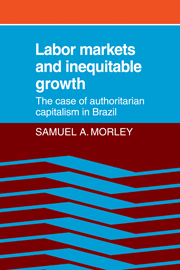Book contents
- Frontmatter
- Contents
- List of tables and figures
- Preface
- Part I Growth, employment creation, and inequality in Brazil
- 1 Introduction
- 2 Production and employment trends in the postwar period
- 3 Rising inequality since 1960
- 4 The meaning and interpretation of rising inequality in a growing economy
- 5 Evidence on absolute improvements and upward mobility
- Part II The effect of supply and demand on labor markets during rapid economic growth
- Data appendix
- Bibliography
- Index
5 - Evidence on absolute improvements and upward mobility
Published online by Cambridge University Press: 07 October 2011
- Frontmatter
- Contents
- List of tables and figures
- Preface
- Part I Growth, employment creation, and inequality in Brazil
- 1 Introduction
- 2 Production and employment trends in the postwar period
- 3 Rising inequality since 1960
- 4 The meaning and interpretation of rising inequality in a growing economy
- 5 Evidence on absolute improvements and upward mobility
- Part II The effect of supply and demand on labor markets during rapid economic growth
- Data appendix
- Bibliography
- Index
Summary
In the previous chapter we investigated the measurement and interpretation of income inequality in growing economies. We went as far as we could in comparing cross-section estimates of the distribution of income. But these distribution measures ignore two vital aspects of the problem: absolute income levels and the distribution of lifetime income as opposed to income in a given year. If these questions are important to people – and surely they are – they must be included in any attempt to derive conclusions about welfare from income statistics.
Here we shall augment the data on the distribution of income with evidence on such things as changes in living standards, the elimination of poverty, and upward mobility, which is an imperfect proxy for lifetime income. These measures suggest that substantial improvements have occurred, but that the situation of poor families has been and remains precarious.
Trends in indicators of the standard of living
One of the difficulties with distribution statistics is that they ignore altogether the level of income. We want to correct that deficiency here by presenting a number of indicators of the Brazilian standard of living. The most simple and straightforward index of the standard of living is, of course, per capita real income. It has been rising rapidly in Brazil. The economy has been as successful as almost any in the world in producing material progress for its people. While these increases may not make up for rising inequality in the distribution of income, no fair-minded observer can ignore the substantial improvements in living standards in recent years.
- Type
- Chapter
- Information
- Labor Markets and Inequitable GrowthThe Case of Authoritarian Capitalism in Brazil, pp. 83 - 110Publisher: Cambridge University PressPrint publication year: 1983



